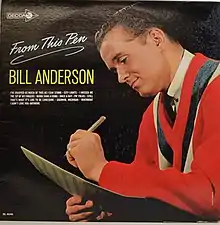| From This Pen | ||||
|---|---|---|---|---|
 | ||||
| Compilation album by | ||||
| Released | June 1965 | |||
| Recorded | 1958–1965 | |||
| Studio |
| |||
| Genre | ||||
| Length | 33:20 | |||
| Label | Decca | |||
| Producer | Owen Bradley | |||
| Bill Anderson chronology | ||||
| ||||
From This Pen is a compilation album by American country music singer-songwriter Bill Anderson. It was released in June 1965 via Decca Records in several sessions produced by Owen Bradley. It was Anderson's second compilation released during his career and contained songs that he had recorded since his signing with the label. Many of the songs featured were major hits for Anderson in preceding years.
Background, release and reception
| Review scores | |
|---|---|
| Source | Rating |
| Record Mirror | |
From This Pen was Anderson's first compilation (and album overall) to feature entirely self-composed material. The album's title was derived from this idea. Although many of these songs were recorded by other artists, Anderson also cut them. This occurred in a series of sessions that took place in his early years at Decca (between 1958 and 1965). All of the sessions were produced by Anderson's long-time studio producer, Owen Bradley. The recording sessions were held at both the Bradley Studio and the Columbia Studio in Nashville, Tennessee.[3] The album contained a total of 13 tracks. This included the lead track, which served as a spoken introduction to the album.[1] Only two tracks were co-written with other songwriters. The remaining tracks were entirely self-composed. Several of these compositions were pitched to other country artists and became major hits during this time. These former hits include Connie Smith's "Once a Day," Lefty Frizzell's "Saginaw, Michigan," Ray Price's "City Lights" and Charlie Louvin's "I Don't Love You Anymore."[3]
From This Pen was released in June 1965 on the Decca label. It was Anderson's second compilation released in his music career.[3] The record was issued as a vinyl LP, containing seven track on side one and six tracks on side two.[4] From This Pen spent 14 weeks on the Billboard Top Country Albums chart and peaked at number seven in October 1965.[5] It became Anderson's third album to chart on the Billboard country albums survey.[6] From This Pen received positive reception from Allmusic, who rated the record three out of five stars.[1]
Track listing
All songs composed by Bill Anderson, except where noted.[3]
| No. | Title | Writer(s) | Length |
|---|---|---|---|
| 1. | "Introduction" | 1:00 | |
| 2. | "Saginaw, Michigan" |
| 3:12 |
| 3. | "City Lights" | 3:00 | |
| 4. | "Once a Day" | 2:35 | |
| 5. | "I Missed Me" | 2:45 | |
| 6. | "Mama Sang a Song" | 3:27 | |
| 7. | "That's What It's Like to Be Lonesome" | 2:30 |
| No. | Title | Writer(s) | Length |
|---|---|---|---|
| 1. | "Riverboat" | 2:24 | |
| 2. | "The Tip of My Fingers" | 2:29 | |
| 3. | "I've Enjoyed as Much of This as I Can Stand" |
| 2:32 |
| 4. | "Po' Folks" | 2:50 | |
| 5. | "I Don't Love You Anymore" | 2:28 | |
| 6. | "Still" | 2:45 |
Personnel
All credits are adapted from the liner notes of From This Pen.[3]
Musical personnel
- Bill Anderson – lead vocals
- Harold Bradley – banjo, guitar
- Floyd Cramer – piano, vibes
- Jimmy Day – steel guitar
- Pete Drake – steel guitar
- Buddy Emmons – steel guitar
- Buddy Harman – drums
- Tommy Jackson – fiddle
- Bob Moore – bass
- Morris Palmer – drums
- Jimmy Riddle – harmonica
- The Anita Kerr Singers – background vocals
- Joe Zinkan – bass
Technical personnel
- Owen Bradley – producer
Chart performance
| Chart (1965) | Peak position |
|---|---|
| US Top Country Albums (Billboard)[7] | 7 |
Release history
| Region | Date | Format | Label | Ref. |
|---|---|---|---|---|
| Canada | June 1965 | Vinyl | Decca | [8] |
| United States | [4][1] | |||
References
- 1 2 3 4 "From This Pen: Bill Anderson: Songs, Reviews, Credits". Allmusic. Retrieved July 10, 2020.
- ↑ Jones, Peter; Jopling, Norman (February 19, 1966). "Bill Anderson: From This Pen" (PDF). Record Mirror. No. 258. p. 8. Archived from the original (PDF) on April 1, 2022. Retrieved August 22, 2022.
- 1 2 3 4 5 Anderson, Bill (June 1965). "From This Pen (Liner Notes and Album Information)". Decca Records.
- 1 2 3 4 "Bill Anderson – From This Pen (1965, Vinyl)". Discogs. Retrieved July 10, 2020.
- ↑ "From This Pen chart history". Billboard. Retrieved July 10, 2020.
- ↑ Whitburn, Joel (1997). Joel Whitburn's Top Country Albums: 1967–1997. Record Research Inc. ISBN 0898201241.
- ↑ "Bill Anderson Chart History (Top Country Albums)". Billboard. Retrieved July 10, 2020.
- ↑ "Bill Anderson – From This Pen (Canada)". Discogs. Retrieved July 10, 2020.